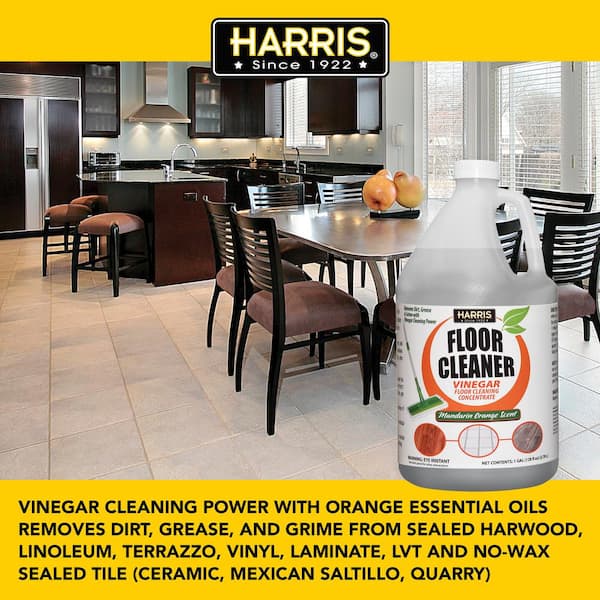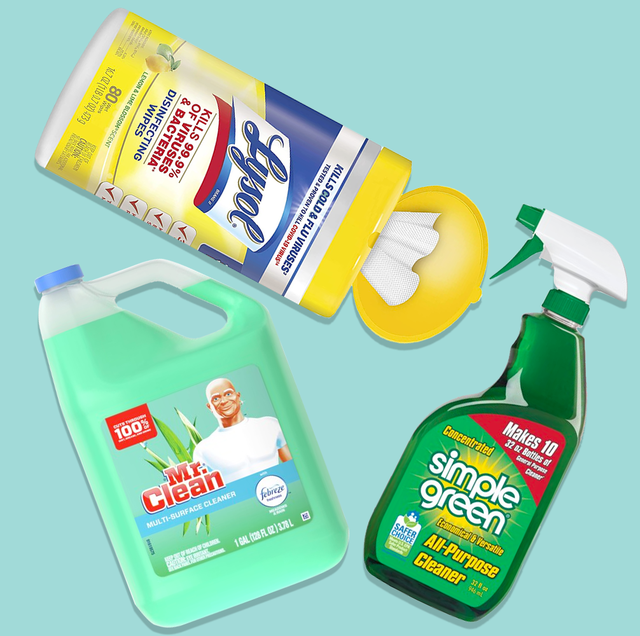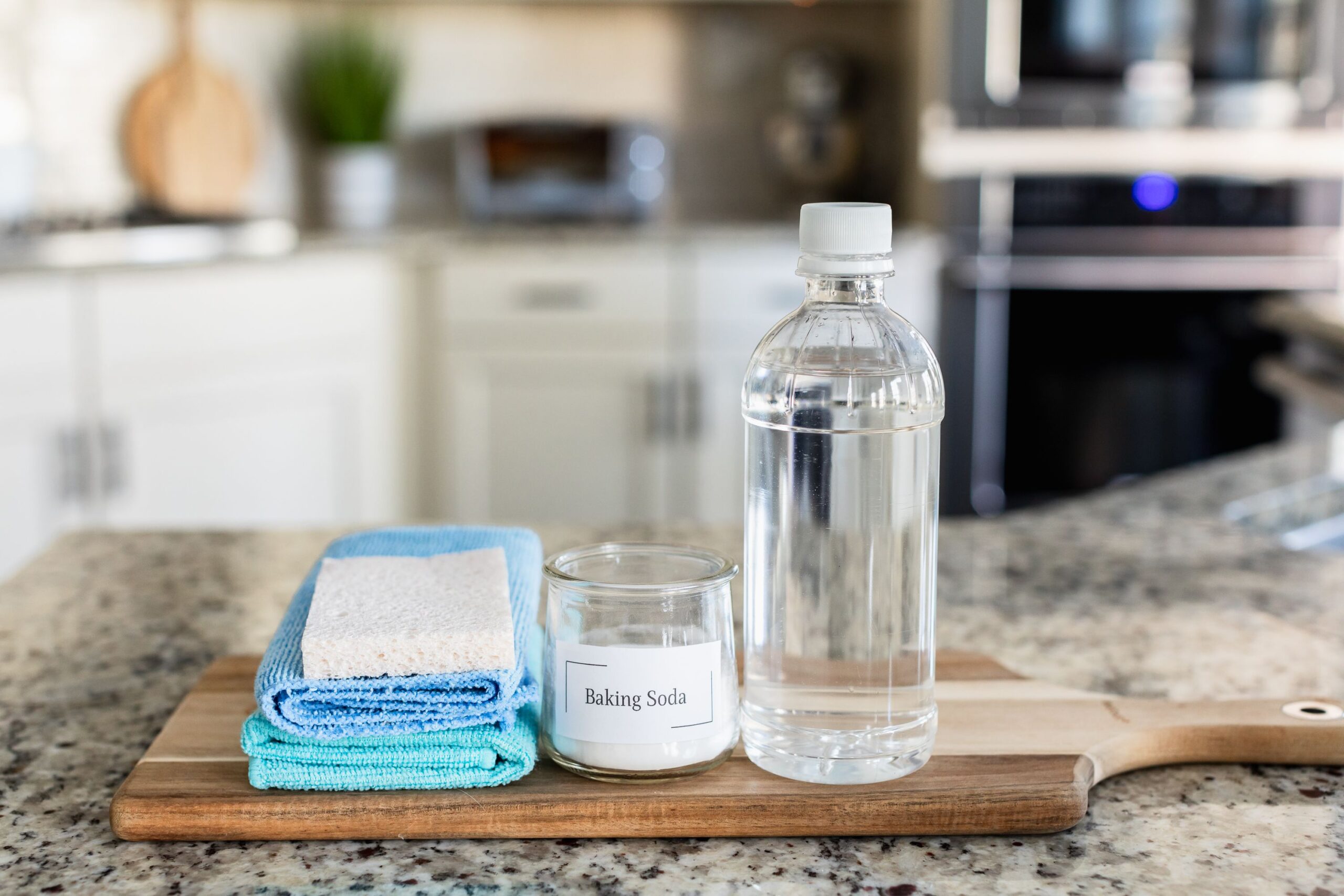Make your own kitchen floor cleaner liquid without using vinegar in just a few simple steps. Vinegar-free homemade kitchen floor cleaner recipes are an eco-friendly and effective alternative for keeping your floors sparkling clean.
Unlike store-bought cleaners that often contain harsh chemicals, these homemade solutions use natural ingredients that are safe for both your family and the environment. We will explore different vinegar-free kitchen floor cleaner recipes that you can easily make at home using common household ingredients.
So, say goodbye to vinegar and hello to a natural, homemade floor cleaner that will leave your kitchen floors shining and smelling fresh!

Credit: www.homedepot.com
Benefits Of Homemade Floor Cleaner
Fed up with expensive store-bought cleaners filled with harsh chemicals? Homemade floor cleaner can be an excellent alternative that not only helps you keep your kitchen floors sparkling clean but also allows you to steer clear of harmful substances. In this section, we will explore the benefits of homemade floor cleaners, including how they can help you avoid harmful chemicals, save money, and be customized to suit your specific needs.
Avoiding Harmful Chemicals
One of the significant advantages of homemade floor cleaner is avoiding harmful chemicals. Many commercial kitchen floor cleaners contain toxins that can be detrimental to your health and the environment. By making your own floor cleaner, you have full control over the ingredients, ensuring that only safe and natural substances are used. This means you can eliminate the worry of exposing your family and pets to potentially hazardous chemicals and breathe easier knowing you’re taking a step towards a healthier home environment.
Cost-effective Solution
Another benefit of homemade floor cleaner is that it’s a cost-effective solution. Buying commercial floor cleaners can quickly add up, especially if you find yourself frequently mopping up spills or dealing with high foot traffic in your kitchen. In contrast, making your own floor cleaner allows you to save money by using readily available ingredients that are often already present in your pantry. With just a few simple ingredients, you can whip up a batch of homemade floor cleaner that will get your kitchen floors just as clean without burning a hole in your wallet.
Customizable To Specific Needs
Homemade floor cleaner offers the advantage of being customizable to suit your specific needs. Different types of flooring, such as tile, laminate, or hardwood, may require different cleaning solutions. By making your own floor cleaner, you have the flexibility to adjust the ingredients to match your flooring type. You can even personalize the scent of your cleaner by adding essential oils. This customization ensures that you can meet the unique demands of your kitchen floors, giving them the care and attention they deserve.
Powerful And Effective Homemade Floor Cleaner Recipes
When it comes to keeping your kitchen floor clean and sparkling, there are plenty of store-bought options available. However, if you prefer a more natural and budget-friendly approach, homemade floor cleaners can be just as effective. Plus, you have the added benefit of knowing exactly what goes into the cleaner you’re using.
Recipe 1: Baking Soda And Lemon Juice Solution
One of the most powerful and versatile homemade floor cleaner recipes is the combination of baking soda and lemon juice. This dynamic duo not only cleans dirt and grime from your kitchen floor but also leaves behind a fresh and invigorating scent.
To make this mixture, you’ll need:
- – 1/2 cup of baking soda
- – The juice of two lemons
- – 2 cups of warm water
Instructions:
- Mix the baking soda and lemon juice in a bowl until it forms a paste.
- Add the warm water gradually and stir well to combine.
- Using a mop or a cloth, apply the solution to your kitchen floor.
- Scrub any stubborn stains or marks with a brush.
- Rinse the floor thoroughly with clean water and let it air dry.
Recipe 2: Hydrogen Peroxide And Dish Soap Mixture
If you’re dealing with tough stains or persistent grease on your kitchen floor, this recipe combining hydrogen peroxide and dish soap is a game-changer. The hydrogen peroxide acts as a natural bleaching agent, while the dish soap helps cut through grease and grime.
Here’s what you’ll need:
- – 1/4 cup of hydrogen peroxide
- – 2 tablespoons of dish soap
- – 2 cups of warm water
Instructions:
- Mix the hydrogen peroxide, dish soap, and warm water in a bucket.
- Stir the solution until all the ingredients are well combined.
- Apply the mixture to your kitchen floor using a mop or a sponge.
- Gently scrub any stubborn stains or grease marks.
- Rinse the floor thoroughly with clean water and allow it to air dry.
Recipe 3: Essential Oil And Water Blend
If you prefer a milder and more fragrant homemade floor cleaner, this recipe featuring essential oils is a fantastic option. Not only will it leave your kitchen floor looking clean and shiny, but it will also infuse your space with a pleasant scent.
For this recipe, gather the following ingredients:
- – 10 drops of your favorite essential oil (such as lavender, lemon, or tea tree oil)
- – 2 cups of warm water
Instructions:
- Pour the warm water into a spray bottle.
- Add the essential oil drops to the bottle.
- Screw the cap back on and shake the bottle to mix the ingredients.
- Lightly spray the solution onto your kitchen floor.
- Using a mop or a cloth, wipe the floor clean.
- Allow the floor to air dry.
Tips For Using Homemade Floor Cleaner
Using homemade floor cleaner can be a cost-effective and eco-friendly solution for keeping your kitchen floors sparkling clean. However, there are some important tips to keep in mind to ensure you get the best results. Follow these guidelines to make the most of your homemade floor cleaner:
Test On A Small Area First
Before using your homemade floor cleaner on the entire kitchen floor, it’s crucial to test it on a small, inconspicuous area. This is especially important if you have a sensitive or delicate flooring material such as hardwood or laminate. By conducting a patch test, you can ensure that the cleaner won’t cause any discoloration, damage or other negative effects.
Follow Proper Dilution Ratios
Homemade floor cleaners usually require dilution with water or other ingredients to achieve the right balance of cleaning power without being too harsh. It’s essential to follow the recommended dilution ratios provided with the recipe or instructions for your specific cleaner. Using too much of the concentrated cleaner can leave residues, dull the floor’s finish, or even damage the flooring material. On the other hand, using too little might not provide sufficient cleaning power to effectively remove dirt and grime.
Use The Right Tools And Techniques
Even with a homemade floor cleaner, using the right tools and techniques is crucial for achieving the best results. Consider using a microfiber mop or a soft-bristle brush for scrubbing, depending on your floor type. Microfiber is a great choice as it traps dirt and debris effectively and is gentle on floors. Avoid using abrasive brushes or harsh scrubbing techniques that can scratch or damage the surface.
Summary:
– Before applying homemade floor cleaner to the entire kitchen floor, perform a patch test on a small area to ensure it won’t cause any damage or discoloration.
– Follow the recommended dilution ratios provided with the recipe or instructions for your specific homemade floor cleaner to avoid residues or damage.
– Use the appropriate tools and techniques, such as a microfiber mop or soft-bristle brush, to effectively clean your kitchen floors without causing any scratches or damage.

Credit: www.goodhousekeeping.com

Credit: yoursandmineareours.com
Frequently Asked Questions For Kitchen Floor Cleaner Liquid Homemade Without Vinegar
How Do You Make Mopping Solution Without Vinegar?
To make a vinegar-free mopping solution, combine warm water with a small amount of dish soap or floor cleaner. Mix well and use for mopping your floors. It’s an effective alternative to vinegar-based solutions.
How Do You Clean A Kitchen Without Vinegar?
To clean a kitchen without using vinegar, try these alternatives: use lemon juice or baking soda mixed with water, use a mild dish soap and warm water solution, or make a mixture of hydrogen peroxide and water. These options will effectively clean your kitchen without vinegar.
What Is A Simple Homemade Floor Cleaner?
A simple homemade floor cleaner can be made by mixing vinegar and water in a 1:1 ratio.
How Do You Make A No Rinse Floor Cleaner?
To make a no rinse floor cleaner, combine 1 cup of white vinegar, 1 tablespoon of dish soap, and 1 gallon of warm water. Mix the ingredients well and use this solution to clean your floors without the need to rinse afterward.
It’s an easy, effective, and time-saving solution for maintaining clean floors.
Conclusion
There are several effective alternatives to vinegar for making a homemade kitchen floor cleaner liquid. From using lemon juice and baking soda to utilizing essential oils and dish soap, these solutions provide a safe and natural way to keep your floors sparkling clean.
Experiment with different combinations and find the one that works best for you. With a little bit of effort, you can achieve a spotless kitchen floor without the need for vinegar.

